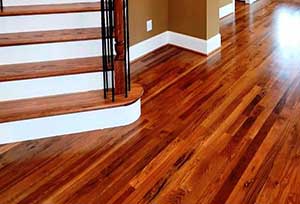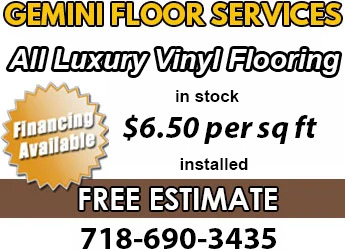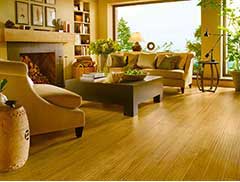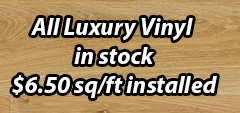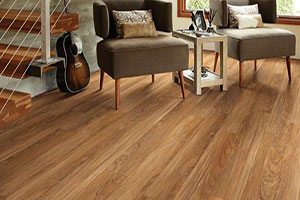 LVT flooring – let’s break it down & cover the essential points. (LVT) Luxury Vinyl Tile & (LVP) Luxury Vinyl Plank is currently the most searched for type of flooring. Technology has evolved immensely in the flooring industry and vinyl has come a long way. When we talk about luxury vinyl tile, we’re not speaking of cheap, tacky vinyl from the 70’s & 80’s that wore out overnight. Today vinyl flooring is very durable, long lasting AND affordable.
LVT flooring – let’s break it down & cover the essential points. (LVT) Luxury Vinyl Tile & (LVP) Luxury Vinyl Plank is currently the most searched for type of flooring. Technology has evolved immensely in the flooring industry and vinyl has come a long way. When we talk about luxury vinyl tile, we’re not speaking of cheap, tacky vinyl from the 70’s & 80’s that wore out overnight. Today vinyl flooring is very durable, long lasting AND affordable.
“Luxury vinyl” refers to thicker, high quality vinyl products. LVT can replicate any material like wood or stone so realistically that it’s practically indistinguishable. Standard vinyl products – those not labeled as “luxury vinyl”, can also be pretty good for light traffic. But luxury vinyl is about 5 times thicker than regular vinyl and stands up to heavier use for residential & commercial surfaces. It has a thicker, more durable wear layer & usually comes with a 10-15 year manufacturer’s warranty. It resists scuffs, scratches, stains, denting & warping. The look, design & feel of luxury vinyl is more realistic & can even have a textured & embossed surface.
Luxury vinyl comes in a vast array of designs & sizes. There’s many tile mosaic patterns & parquet patterns like herringbone can be made with planks just like hardwood. It can even be grouted like ceramic tile. It’s available as tiles (LVT), planks (LVP) & even sheets. Most planks range 36-48 inches long & 6-8 inches wide. Sheets are up to 12 feet wide.
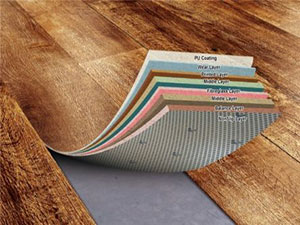
Loose Lay LVT
LVT flooring is one of the easiest DIY flooring projects. Standard vinyl is often easy peasy peel & stick, while LVT comes as ‘click lock’ – easy click together install, or ‘loose lay’ – just lay it down & the thick rubber backing holds it in place. These are ‘floating floor’ installs, meaning it’s laid down over the existing flooring without any tacks or glue. Glue down is a type of install that’s best left to the professionals & it’s best for increased water resistance. Sheet vinyl & glued down tiles or planks add additional protection from water getting into the subfloor through the seams. Another nice thing about floating floors is it’s easy to replace damaged tiles. Just make sure you purchase a few extra boxes should you ever need some in the future. You can even remove the luxury vinyl & install it in another room should you move or just want to change things up.
LVT Flooring Composition
Luxury vinyl is a flexible type of flooring. It’s composed of at least several layers fused together & the core layer is pvc (polyvinyl chloride), a type of plastic. The bottom, backing layer is often composed of foam or cork which adds cushion & insulates sound & temperature. A design layer contains a 3D printed image which creates the replicated look of wood, stone, tile or any material. The top, wear layer is a clear coat of urethane or aluminum oxide which enhances the image layer, adding depth while protecting the image layer by resisting scuffs & scratches. Most Luxury vinyl tile or plank is 4-8mm thick (.16 to .32 inches). The wear layer is measured in mils (not mm), which is thousandth of an inch & ranges around 12 to 20 mil for residential and 20+mil for heavy duty residential & industrial use. While a thicker tile or plank may add more comfort, the thickness of the wear layer is actually what is most important because that is what will mostly determine the longevity.
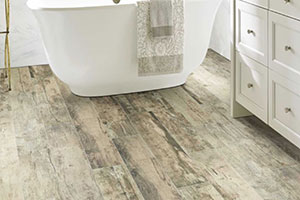
Waterproof Vinyl
LVT flooring can be labeled as either water resistant or waterproof. If you need something for moisture prone areas like a basement or bathroom, look for 100% waterproof. This offers more protection than something labeled as just water resistant. As mentioned, glued down tiles & planks, or best yet sheet vinyl, offers the most protection from moisture. Though not all LVT flooring claiming 100% waterproof will hold up to flooding for long without swelling or getting warped. COREtec is a leading brand that offers 100% waterproof vinyl that can hold up to being submerged in water without ever swelling or warping.
Other Types of Vinyl Flooring
Aside from LVT & LVP, which we’ve already discussed, there are several other acronyms for other types of vinyl flooring namely EVP, WPC, SPC & VCT.
EVP – Engineered Vinyl Plank: a type of click-lock vinyl plank flooring that has a rigid core making the plank stiff rather than flexible like other luxury vinyl. A rigid core gives more of a solid feel like real hardwood & it can help hide minor imperfections in the subfloor better than flexible vinyl. The subfloor should still be as smooth and level as possible. Consider the thickness of the plank because EVP is usually thicker and if it’s too thick there can be a problem in the transition areas. There’s two types of EVP, namely WPC & SPC which each have a different type of rigid core.
WPC – Wood Plastic Composite: a type of rigid core luxury vinyl (EVP) with a core made of wood pulp and extruded foam.
SPC – Stone Plastic Composite: a type of rigid core luxury vinyl (EVP) with a core made of limestone. It is even more hard than wood plastic composite & more resistant to dents.
VCT – Vinyl Composite Tile: Similar to LVT but made with limestone & less vinyl. It used to be the common choice for schools and hospitals but the evolution of LVT flooring is making it less common. It’s more porous and not as waterproof as LVT so it requires more maintenance, regular waxing, polishing, stripping & rewaxing. And it has far less design features, comes in limited colors & designs. However it is less than half the cost upfront to install. But regular maintenance costs will eventually end up costing more than having LVT.
One last thing to consider about luxury vinyl, it is not biodegradable, it’s plastic, not really the most environmentally friendly product. Though quality LVT products do have air quality certifications to prevent VOC (volatile organic compounds) from getting into the air. So look for quality products that have certifications like WELL, LEED & FloorScore.
Some of the top brands which offer high quality LVT flooring with certifications are Pergo, COREtec, Shaw, NuCore, TrafficMaster, Mohawk, Cali Bamboo & Armstrong. As a summary reminder, here’s the main points & benefits we covered about LVT flooring.
• Affordable, expensive looking at lower cost
• Durable, resists stains, scuffs, scratches, dents, warping
• Comfortable, resilient, doesn’t get too cold like tile
• Easy DIY install with click lock or loose lay, easy to cut
• Can be installed or ‘floated’ over mostly any existing flooring with flat surface
• Floating floor tiles & planks can easily be replaced or removed & reinstalled in a different place
• Easy to replace damaged tiles or planks
• Wide selection of designs that realistically replicate natural materials
• Water resistant or water proof
• Easy maintenance, just damp mop
• Has thicker wear layer than standard vinyl & it’s possible to recoat it with polyurethane to extend longevity, though it cannot be sanded like hardwood
• Manufacturer’s warranties
• Some products are antimicrobial
